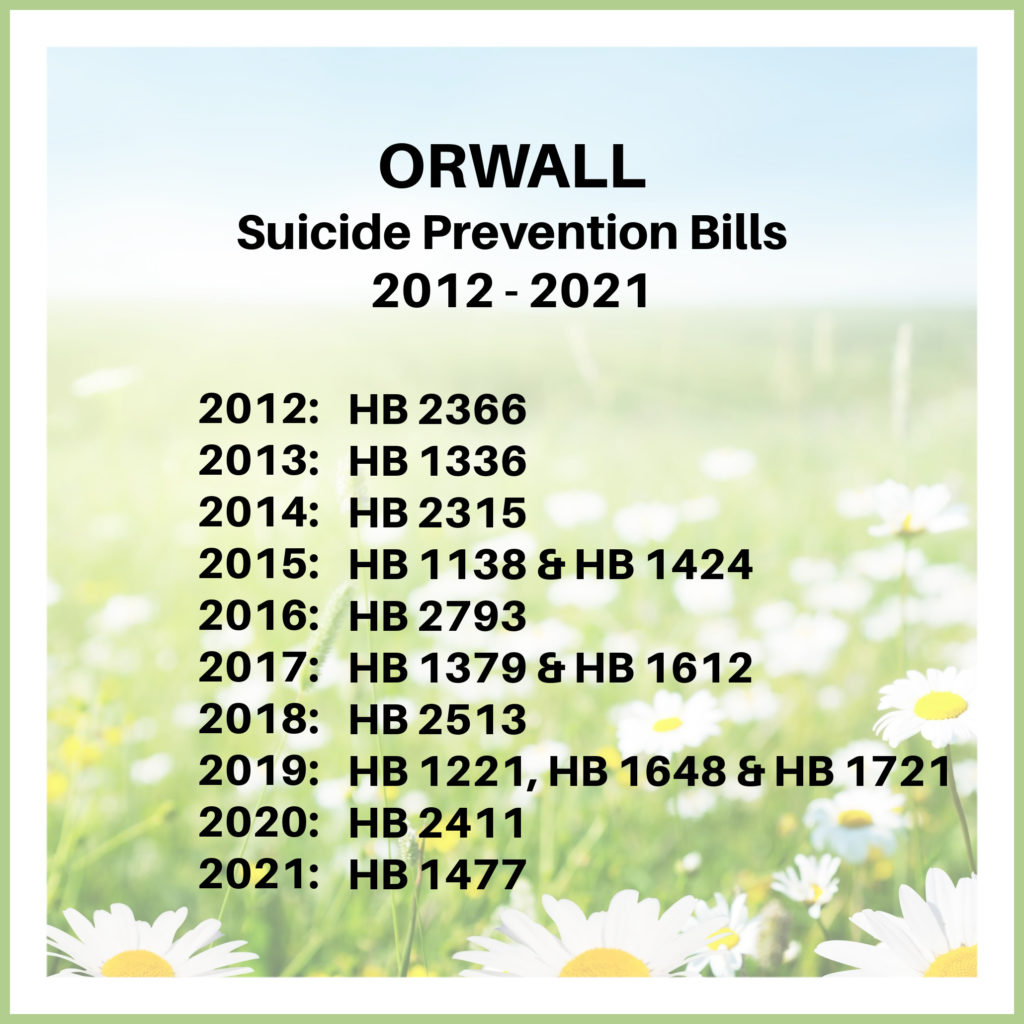
2012: House Bill 2366
Required mental health care professionals to complete training in suicide assessment, treatment, and management every six years beginning January 2014. Commissioned a study by DOH on how evidence-based training affects all licensed health care professionals’ ability to identify, refer, treat, and manage patients with suicidal ideation.
2013: House Bill 1336
Written to improve schools’ capacity to prevent student suicide. Required ESDs to build capacity to train on suicide. Required school district crisis plans, suicide content in teachers’ Issues of Abuse course and 3-hour training for school nurses, counselors, psychologists and social workers.
2014: House Bill 2315
Added the requirement that other healthcare professionals–nurses, doctors, PAs, DOs, etc. –complete one-time training in suicide assessment, treatment, and management. Required DOH to develop a model list of approved suicide training programs, and to convene a steering committee and develop a statewide plan for suicide prevention.
2015: House Bill 1138
Created task force on mental health and suicide prevention at WA higher education institutions.
2015: House Bill 1424
Requires the Department of Health to revisit the list of trainings created under House Bill 2315, set evaluation criteria, and determine which training programs belong on the list. After July 2017 all training health care providers get for certification must be on the list.
2016: House Bill 2793
Creates the Safer Homes Task Force to raise public awareness and increase suicide prevention education among partners in key positions to prevent suicides. Creates a Safe Homes Project to certify firearms dealers and firearms ranges that meet specified requirements as Safer Homes Partners. Requires pharmacist suicide prevention and lethal means training. Requires that the standards for suicide assessment, treatment, and management training include content specific to veterans.
2017: House Bill 1379
Implements a comprehensive approach to suicide prevention and behavioral health in higher education.
2017: House Bill 1612
Creates a Suicide-Safer Homes Project account to support prevention efforts and develop strategies for reducing access to lethal means.
2018: House Bill 2513
Implements a comprehensive approach to suicide prevention and behavioral health in higher education, with enhanced services to student veterans. The statewide resource created would provide and/or develop curriculum to train staff and students in suicide recognition, including the specific needs of student veterans.
2019: House Bill 1221
Creates and funds development of youth-informed mental health promotion and suicide prevention resources. Expanding training to teachers/staff. Improves crisis planning in schools to prevent youth suicide.
2019: House Bill 1648
Requires the Department of Veterans Affairs to develop and implement a statewide plan to reduce suicide among service members, veterans, and their families. Requires dissemination of suicide awareness and prevention materials prepared by the Safer Homes, Suicide Aware Task Force to firearms dealers and licensed pharmacies for distribution to firearms purchasers and pharmacy patients.
2019: House Bill 1721
Creates a Dialectical Behavioral Therapy (DBT) certification program at the University of Washington for graduate students and mental health professionals. Establishes a conditional scholarship for individuals enrolled in the UW evidence- based DBT certificate programs. Devotes 50 percent of the loan repayment awards under the Health Professional Loan Repayment Program to health care professionals providing behavioral health services.
2020: House Bill 2411
Provides advanced suicide prevention training requirements for mental health professionals; adds a one-time training requirement for optometrists, acupuncturists, Eastern medicine practitioners, veterinarians; adds creation of training for construction industry.
2021: House Bill 1477
Implements the national 988 system to enhance and expand behavioral health crisis response and suicide prevention services. This measure will revolutionize the way we get the right help to those who need it, when they need it.
